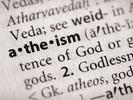Tania Lombrozo appears in the following:
Santa Clues: How Kids Learn The Truth About Christmas
Thursday, December 25, 2014
Today's Christian children don't independently invent Santa Claus from thin (albeit tinsel-laced) air: They learn about Santa from their parents, their peers and their culture.
But what leads them to eventually reject the reality of Santa, as they typically do by age 8 or 9? Is it what they're eventually ...
The Math And Science Of Latkes
Monday, December 15, 2014
Tomorrow evening marks the start of Hanukkah, the Jewish "Festival of Lights" and an eight-day-long excuse to eat fried potato pancakes known as latkes.
This holiday season also marks the return of the Latke-Hamentash Debates, a tradition that began at the University of Chicago in 1946, but ...
What If Atheists Were Defined By Their Actions?
Monday, December 08, 2014
We classify people in all sorts of ways.
Some categories are based on a person's beliefs: A theist, for instance, is a person who believes in one or more gods. Some categories are based on behavior: A vegetarian, for example, is a person who doesn't eat animals. And some categories ...
Does It Matter Who Accepts Evolution?
Monday, December 01, 2014
Since 1982, Gallup has been tracking the American public's views on human origins, providing three mutually exclusive options from which to choose. According to the most recent poll, 42 percent of Americans endorse the idea that God created humans in their present form within the past 10,000 years or ...
Is The Blogosphere Self-Correcting?
Monday, November 24, 2014
Here's a common image of science: Sometimes science gets things wrong, but the scientific process is self-correcting.
The reality is a little messier, of course, but science is still the best system we've got for learning about the natural world. In the long run, the scientific community ...
Culture Of Psychological Science At Stake
Tuesday, November 18, 2014
In a video released today at Edge.org, psychologist Simone Schnall raises interesting questions about the role of replication in social psychology and about what counts as "admissible evidence" in science.
Schnall comes at the topic from recent experience: One of her studies was selected for a replication ...
Is It Time To Reappropriate Pink?
Monday, November 10, 2014
"Pink is clearly freighted with sociocultural significance. And much of it isn't pretty."
So writes philosopher Liz Camp in a blog post titled "The Socio-Aesthetics of Pink." In the post, Camp discloses her 2-year-old daughter's deep love of pink, exploring why she herself is so irked by the little ...
Why Lab Rats Don't Observe Daylight Saving Time
Monday, November 03, 2014
Twice a year, most Americans do a truly bizarre thing. In coordinated fashion, we change our clocks an hour ahead or behind and proceed as if the new time tells us what we should be doing: when to eat, when to sleep, when to wake and when to work.
Earth, ...
What An Advertising Challenge Illustrates About The Mind
Monday, October 27, 2014
If you followed tech news last month, you heard a lot about Apple's new iMac with Retina 5K display. And if you came across advertisements on television or online, you undoubtedly saw the display in action.
Or did you?
The trouble is, you can never really appreciate 5120 x ...
Are Factual And Religious Belief The Same?
Monday, October 20, 2014
Consider the following two statements of "belief":
Devon believes that humans evolved from earlier primates over 100,000 years ago.
Devon believes that humans were created less than 10,000 years ago.
These claims are clearly at odds. Since they can't both be true, Devon holds contradictory beliefs. Right?
Maybe not.
A ...
Putting A Critical Eye On Brain Imaging Studies
Monday, October 06, 2014
Hardly a week goes by without some brain imaging study making the rounds in science news.
Last week we read that women had similar patterns of brain activation in brain regions associated with emotion, reward and affiliations when looking at images of their dogs and of their children. Last ...
Domesticated Robots And The Art Of Being Human
Monday, September 29, 2014
In the 1960s — well before Spike Jonze's Samantha — MIT computer scientist Joseph Weizenbaum introduced the world to Eliza, a psychotherapist (of sorts) who interacted with people through a text interface. She's still around today.
In preparing this post, I asked her what makes us human. "Are ...
Being Good Isn't Zero Sum
Monday, September 22, 2014
How Not To Teach Climate Change
Monday, September 15, 2014
In a recent Washington Post piece, Diana Liverman, a professor at the University of Arizona, explains how she used to teach her undergraduates about climate change — and why she stopped.
"A few years ago, I discovered my undergraduates had informally renamed my Intro to Environmental Studies class. ...
Awe, With And Without The Gods
Monday, September 08, 2014
In a 2006 article for the Los Angeles Times, Sam Harris identified 10 myths about atheism, among them the idea that "atheists are closed to spiritual experience."
Harris explained: "There is nothing that prevents an atheist from experiencing love, ecstasy, rapture and awe; atheists can value these experiences and ...
Using Science To Blame Mothers
Monday, August 25, 2014
In a commentary published earlier this month in Nature, Harvard professor Sarah S. Richardson and six co-authors caution scientists, journalists and the public against drawing hasty conclusions from findings concerning epigenetic effects on human development.
Epigenetic effects are those that involve heritable changes to gene expression that don't arise ...
Thinking Like A Scientist Can Help Overcome Allure Of Appearances
Monday, August 18, 2014
Not long ago, Caren Walker, a PhD student at the University of California at Berkeley, was hiking in Tilden Park with her brother Michael when they came upon what looked like wild carrots.
"Yum, yum, yum!" exclaimed Michael (with perhaps greater eloquence, but no less enthusiasm). "These will make a ...
Of This And That: Intimacy In Social Media
Monday, August 11, 2014
The most basic formula in first-order logic is P(x): one predicate, one variable.
It's also the most basic unit of communication — we say something (the predicate) about something (the variable). Delicious chocolate. Chocolate is delicious. Or, if you want to get fancy, you can throw in more formal ...
Reports Of Psychology's Demise Have Been Greatly Exaggerated
Monday, August 04, 2014
Last week, the satirical "news" source The Onion reported that the field of psychology was disbanding as researchers realized they had been studying the mind with nothing but itself.
"We've spent years trying to discern how the mind functions, but today I am forced to admit that ...
Cognitive Science Honors Its Pioneers And Leaders
Monday, July 28, 2014
Every year in mid- to late summer, cognitive scientists from around the world gather expectantly in a hotel foyer or a university courtyard, eager to learn that year's winner of the David E. Rumelhart Prize. Established in 2001, the yearly award honors "an individual or collaborative team making a ...


















